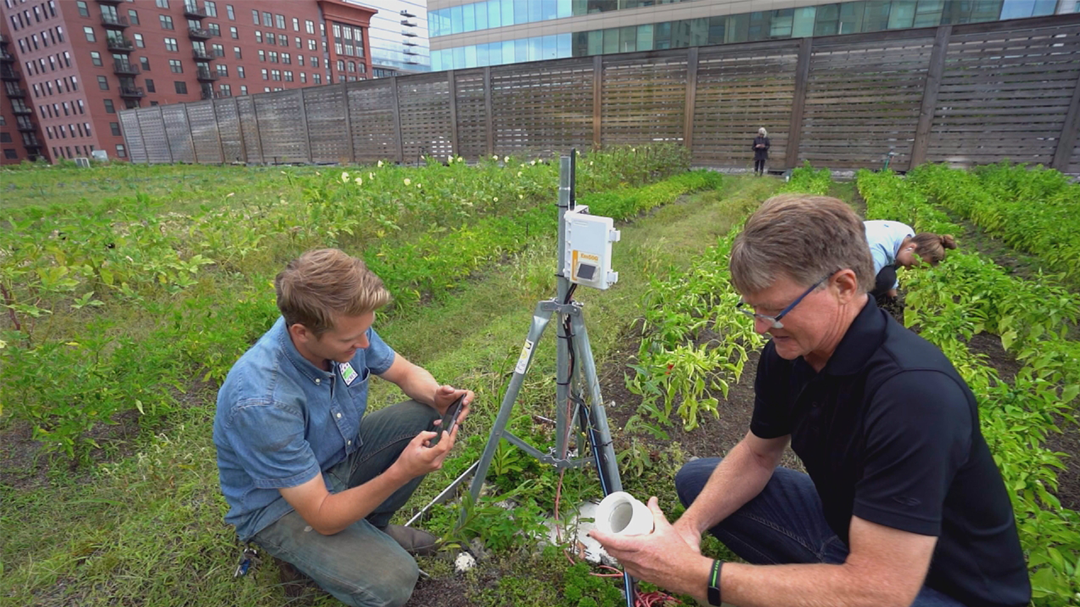John Tolley, January 10, 2020
Farm-to-table, the movement which looks to illuminate and shorten the distance between the two, is all well and good. But what if you?re city-dweller living miles from the nearest farm?
Enter the University of Maryland, who is working to make urban rooftop farming as ubiquitous as the corner Starbucks. The concept is no more difficult to understand than the name. People in cities cultivate their own fruits, vegetables, herbs and flowers on these untapped open spaces.
?The interesting thing about cities is they're fragile,? notes John Lea-Cox, a professor in the Departments of Plant Science and Landscape Architecture at Maryland. ?By fragile I mean that urban people are really dependent upon transport to get food into cities. That's why this kind of urban food production, whether it be at grade or on a rooftop, is really important.?
From the deceptively simple idea of urban rooftop farming sprouts a plethora of potential benefits for cities and surrounding communities alike.
Fresh Food
As alluded to before, due to transport costs and limitations of space, most cities find themselves plagued with food deserts. These are areas where unprocessed, fresh foods are difficult to obtain and grocery stores are difficult to access.
Partnering with Up Top Acres, Maryland is countering this trend, helping the group refine and improve their practices, one rooftop at a time. Kristof Grina, co-owner of Up Top Acres, says that the difference between local and shipped-in produce is night and day.
?It comes to the miles that are attached to the vegetables they are eating,? says Grina. ?We're not even measuring it in miles. We're measuring it in flights of stairs or floors in a building. That has an impact on the freshness of the food, which correlates to the nutrient density.?
A Helping Hand
The partnership between Maryland and Up Top Acres began when the urban farmers found themselves out of their element in terms of data collection. They launched a program to gauge the performance of Up Top Acres? systems, but quickly saw the potential for more.
Lea-Cox, alongside Andrew Ristvey, extension specialist at Maryland?s Wye Research and Education Center, helped Up Top Acres develop soil media blends and a nutrient management program for the unique environment.
?For the last ten or fifteen years, I've been involved in sensor driven irrigation and nutrient management,? says Lea-Cox. ?What that does is it actually provides the tools for Kristof to monitor his practices in real time. What we are doing is we're providing sensors that will actually sense not only the soil, the soil moisture, but also the atmosphere. So, what we do is we connect the dots. Connect the dots, provide that information to Kristof, so that he can get on with his day, he can understand what's happening in the soil and make better decisions.?
Weathering Storms
Another especially salient benefit for the state of Maryland, which hugs the Chesapeake Bay, is the role urban rooftop farms can play in mitigating the detrimental effects of stormwater.
Modern cities, covered in a skin of concrete, asphalt and other impermeable materials, displace natural areas of soil and vegetation. Without these elements to capture the rain, it careens out of the area and into local waterways. As it does, that rain carries pollutants and nutrients, negatively impacting the entire ecosystem.
Ristvey explains that urban rooftop farms can help hold back the wash. ?A green roof system, if it's working and functioning properly, is retaining stormwater and preventing that initial slug of stormwater from getting into the waterways.?
Back to Nature
On a more philosophical level, Lea-Cox says that urban rooftop farms of any scale afford city dwellers a connection to the natural world. Beyond the nutritional and environmental benefits of the farm plots, he surmises that people yearn to get their fingernails a little dirty.
?Of course, an urban area is a really exciting place to live,? says Lea-Cox. ?But I think what a lot of us miss is that connection to the earth. That's what's so great about working for a land-grant university, is that we are connecting people back to the earth.?







